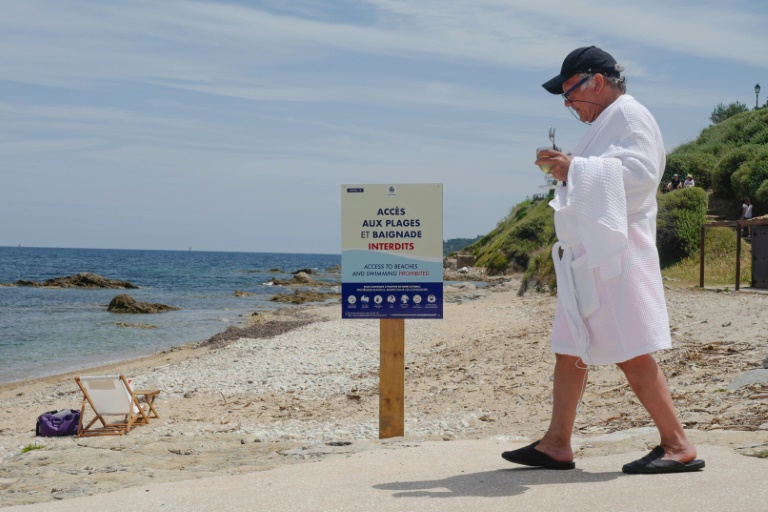
Healthcare systems across Latin America risk being overwhelmed by the coronavirus, the World Health Organization has said, as the death toll from the disease in hard-hit Brazil nears 30,000.
The warning from the global health body came as a sister UN agency issued new guidelines for pandemic-hit airlines that reveal what flying might look like when passenger planes take to the skies again in earnest.
The march of the illness across the Americas comes as other parts of the world return to relative normality after weeks of restrictions on daily life that have wrecked economies and left millions jobless.
Schools, swimming pools, pubs and tourist sites have begun to throw open their doors again in Europe as the continent continues easing lockdowns despite the threat of a second wave of infections.
The pandemic has now killed more than 377,000 people and infected at least 6.3 million since erupting in China in late 2019.
Four of the 10 countries across the globe with the greatest number of new COVID-19 cases on Monday were in Latin America, WHO emergencies director Michael Ryan said.
Brazil, Peru, Chile and Mexico are suffering the highest daily increases but numbers are also on the rise in Argentina, Bolivia, Colombia and Haiti.
“Countries are having to work very, very hard to both understand the scale of infection but also health systems are beginning to come under pressure,” said Ryan.
The region has logged one million cases and recorded more than 50,000 deaths, with Brazil accounting for more than half of those cases and close to 60 percent of the fatalities.
The mayor of Rio de Janeiro said Monday however that the popular tourist city would start gradually easing lockdown measures from Tuesday, beginning with the reopening of places of worship and water sports.
Mexico also began reopening on Monday, reactivating the automotive industry, mining and construction even as the country recorded more than virus 10,000 deaths.
Ryan warned that the region faces a tough battle in the weeks ahead.
“I don’t believe we have reached the peak in that transmission and, at this point, I cannot predict when we will,” he said.
– ‘Light at the end’ –
In Europe however, from Russia to France, Italy and Britain, countries have started to emerge from lockdowns, cautiously adopting a post-pandemic version of normal.
Bars began to serve again in Finland and Norway — with social distancing restrictions or shortened hours in place — while some schools in Britain and Greece opened their doors.
Britain reported 111 more virus deaths on Monday, the lowest daily toll since its lockdown started on March 23.
London’s Camden Market cautiously opened for the first time in 10 weeks, with stallholders excited to welcome customers.
“We are starting to see a light at the end of the tunnel,” said Mario Warner, owner of a nearby clothing store that has been given the green light to open in two weeks.
Greece opened some hotels, schools, pools and tattoo parlors, while Italy reopened the Colosseum, although only to Italians.
There was also good news from Spain, which on Monday recorded its first 24-hour period without a COVID-19 death since March 3.
France registered 31 deaths over the last 24 hours, and on Tuesday is set to reopen cafes, restaurants and bistros, closed since its lockdown began in mid-March.
– Gatherings hit –
Much of East Asia meanwhile has seen infection numbers slow to a trickle in recent weeks but mass gatherings continued to fall victim to virus restrictions.
Hong Kong’s annual candlelight vigil for those killed in China’s 1989 Tiananmen Square crackdown has been banned for the first time due to COVID-19 concerns.
And in New Zealand Prime Minister Jacinda Ardern criticised Black Lives Matter protesters for flouting social distancing rules when the country is on the verge of eliminating the virus.
With businesses and citizens growing tired of confinement, pressure is building on national leaders to end the lockdowns — especially in countries where outbreaks appear to be slowing.
Businesses have been under immense pressure as lockdowns keep consumers and employees at home, with the global airline industry among the hardest hit after tourism dried up.
As the sector seeks to forge a future amid the continued threat from the virus, the International Civil Aviation Organization on Monday released a “framework” for assuring the safety of passengers and workers.
Travellers should be forced to present health certificates at airports and undergo temperature checks, the ICAO said.
There were also snippets of inspiration however among the reams of bad news.
Hundreds of bands took their music to the streets of Lithuania to lift people’s spirits as the Baltic nation allowed public gatherings again.
About 400 bands performed 15-minute sets in cities and towns across the country in a government-sponsored initiative.
“Our orchestra is extremely happy to meet and make music again,” said Modestas Barkauskas, chief conductor of the Vilnius St. Christopher Chamber Orchestra in the capital Vilnius.
“We want to share our joy with you because music is medicine for the soul.”
burs-axn/hg
Image: AFP / VALERY HACHE France is among the countries easing the lockdown restrictions




